One interesting thing that has emerged over the last few provocative years has been a deep dive by highly intelligent and well-educated people into the nature of the Petrine Ministry, its role, parameters, etc. I just finished reading a piece by Philip Lawler at Catholic Culture about a new book by Fr. Serafino Lanzetta, Super Hanc Petram: The Pope and the Church at a Dramatic Moment in History. (US – HERE – UK HERE).
I note with interest that Lanzetta’s book is published by Os Justi Press.
As it happens, I received via mail a copy of another book by Os Justi Press, Ultramontanism and Tradition: The Role of Papal Authority in the Catholic Faith edited by by Peter A. Kwasniewski (US HERE – UK HERE)
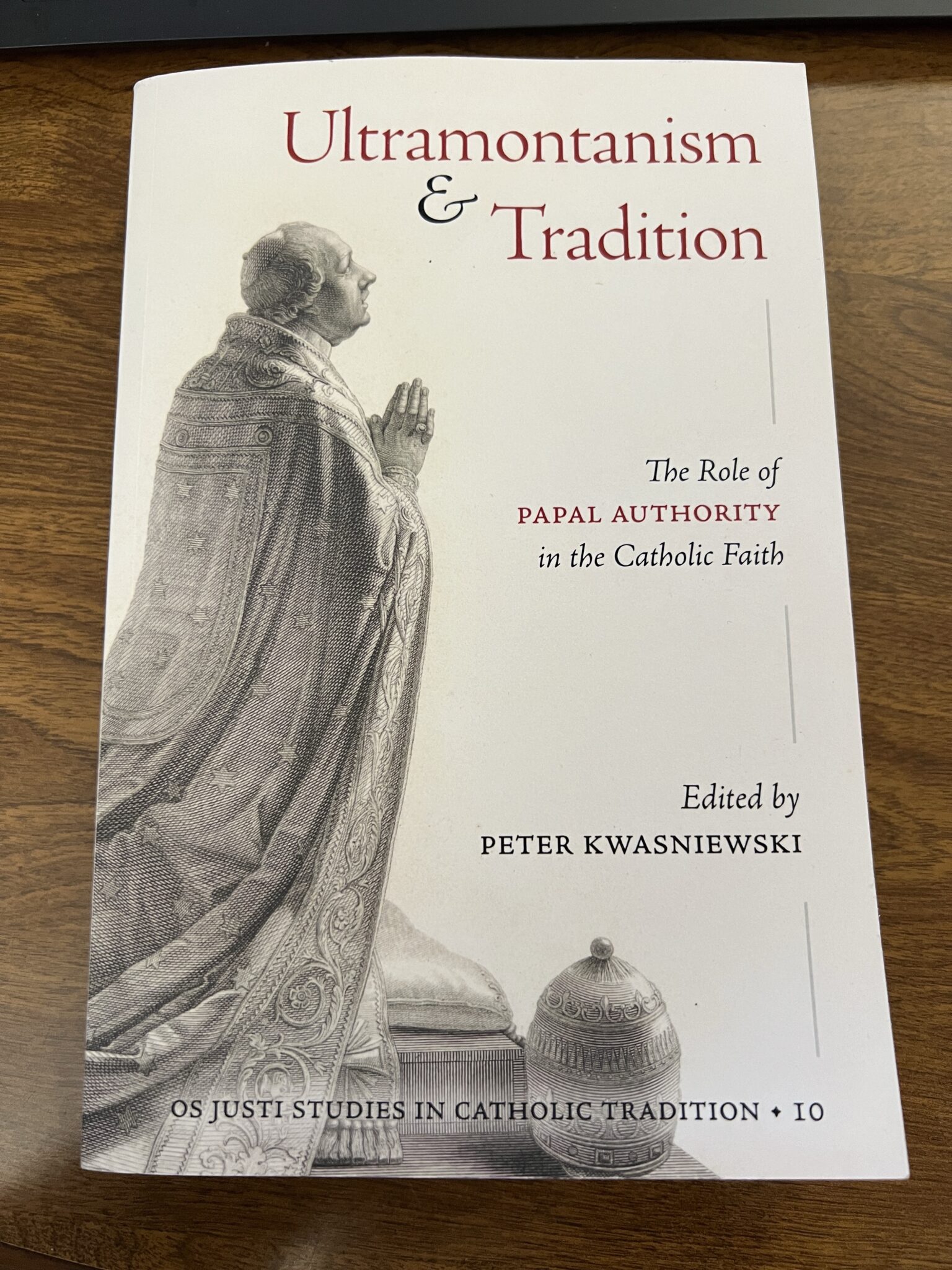
One thing I noticed was the dedication, because I happen to have relics of some of these saints. I lent my relic of Catherine of Siena to a consecrated virgin. I wonder if I will ever get it back. Hmmm.
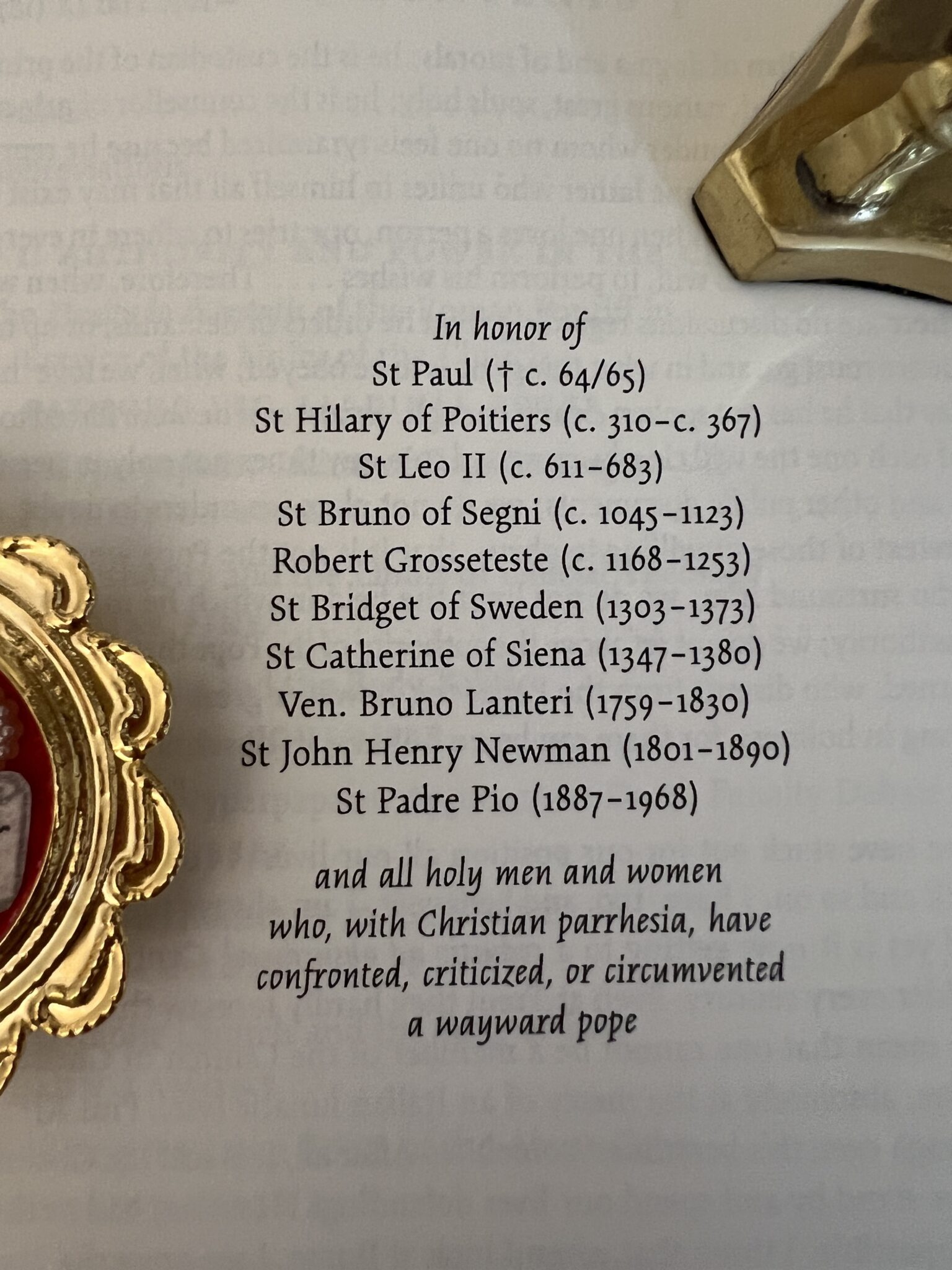
In the large one is St. Paul, in the small, upright one is St. Padre Pio, and in the flat gold reliquary is St. Bruno of Segni.
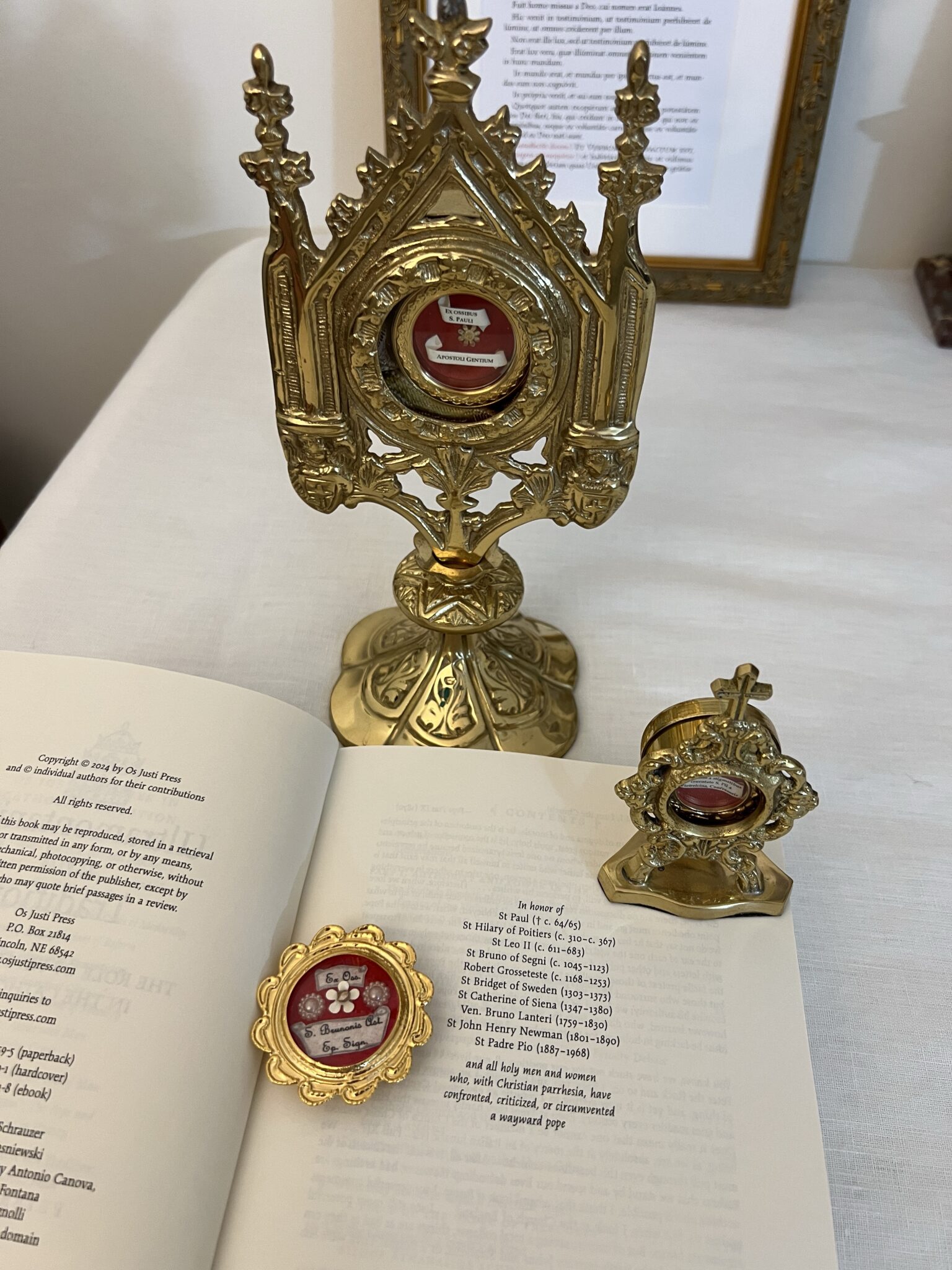
I have not delved into this volume yet, so I don’t have a lot to say about it, other than the titles of some of the entries are intriguing. I hope that one of more of them will deal with or at least touch on with references the issue of whether or not the Petrine Ministry of Vicar of Christ is inextricably tied to being Bishop of the See of Rome. I think this was discussed at Vatican I, but I would like to know more. These days, I am sure that most serious theologians will say, yes, they are inextricably bound together. That doesn’t make a lot of sense to me. Rome could be obliterated as it is, for example, in the harrowing book by Frank Herbert (who wrote more than Dune) The White Plague. Disturbing book. Brrrr. (US – HERE UK – HERE)
Here’s the table of contents for the newly received book. You will recognize a lot of names. You will also see that some of these essays are polemical and aimed a t particular figure.
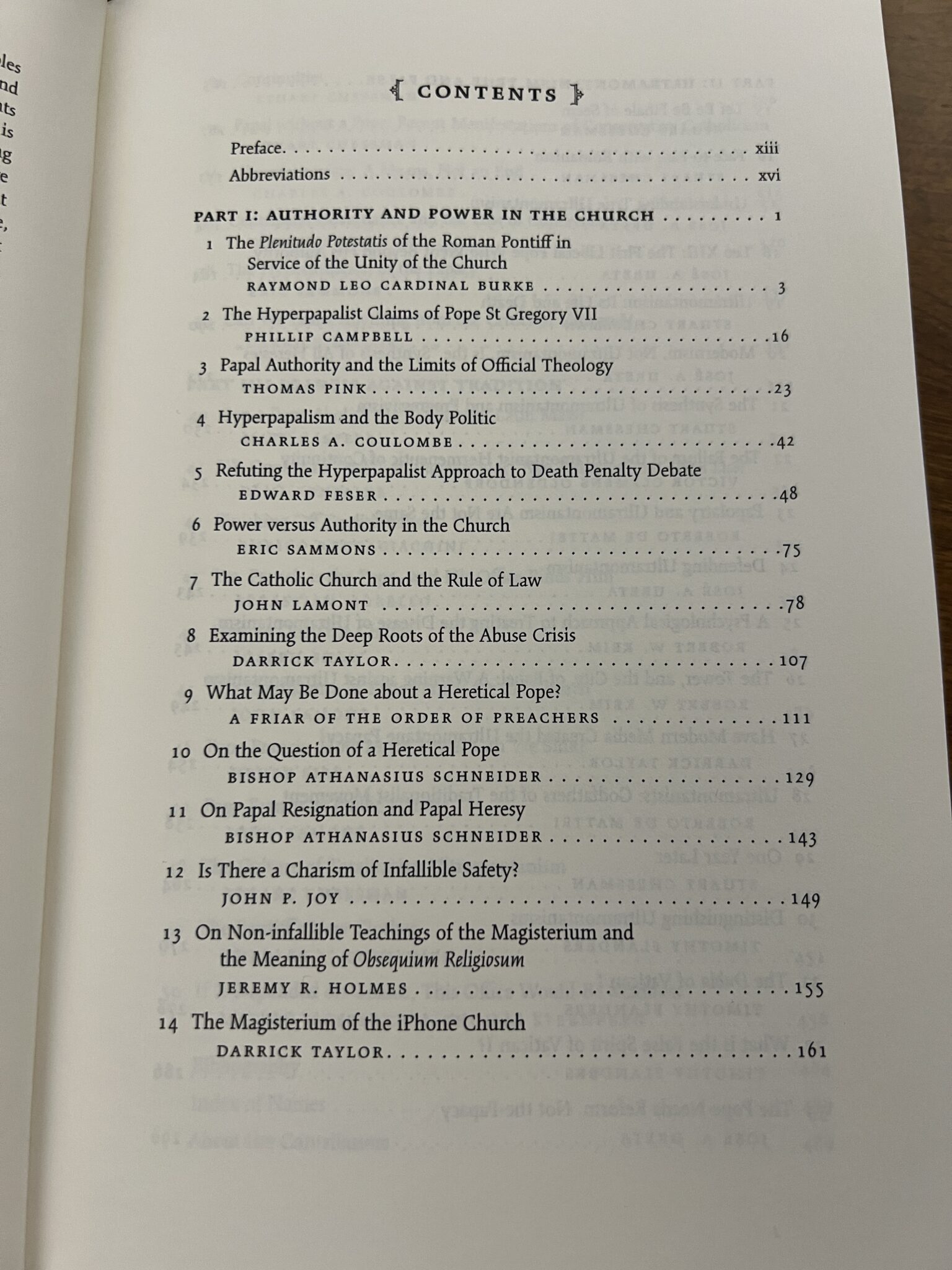
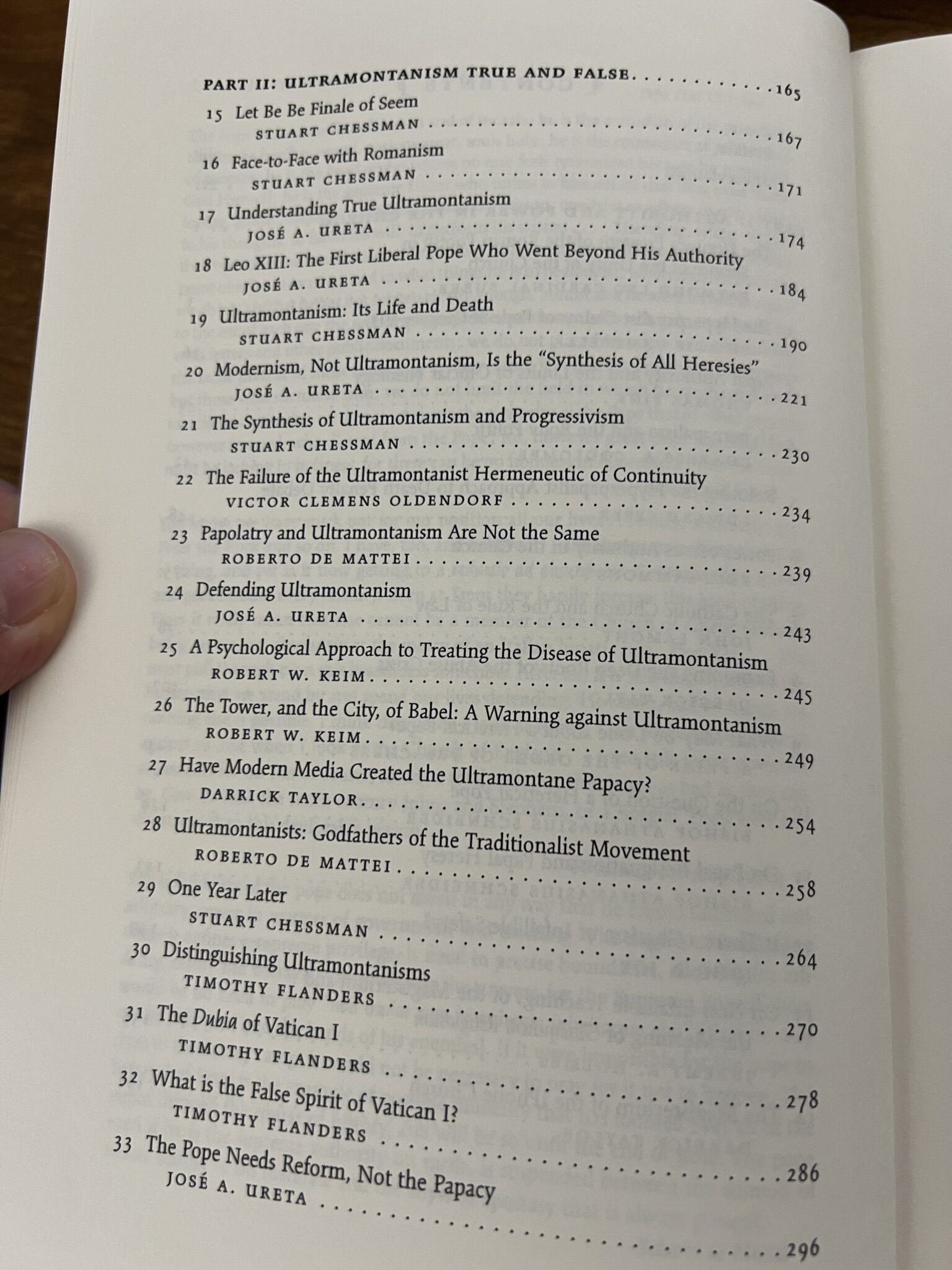
In the Third Part there is a lot about the war being waged on the people who desire the Traditional Latin Mass. Remember: it is not just a war on the rite of Mass, it is a war on the people who desire that rite. As I mentioned, some of these titles seem to be rather disputatious in regard to a certain someone. But I haven’t read them yet.
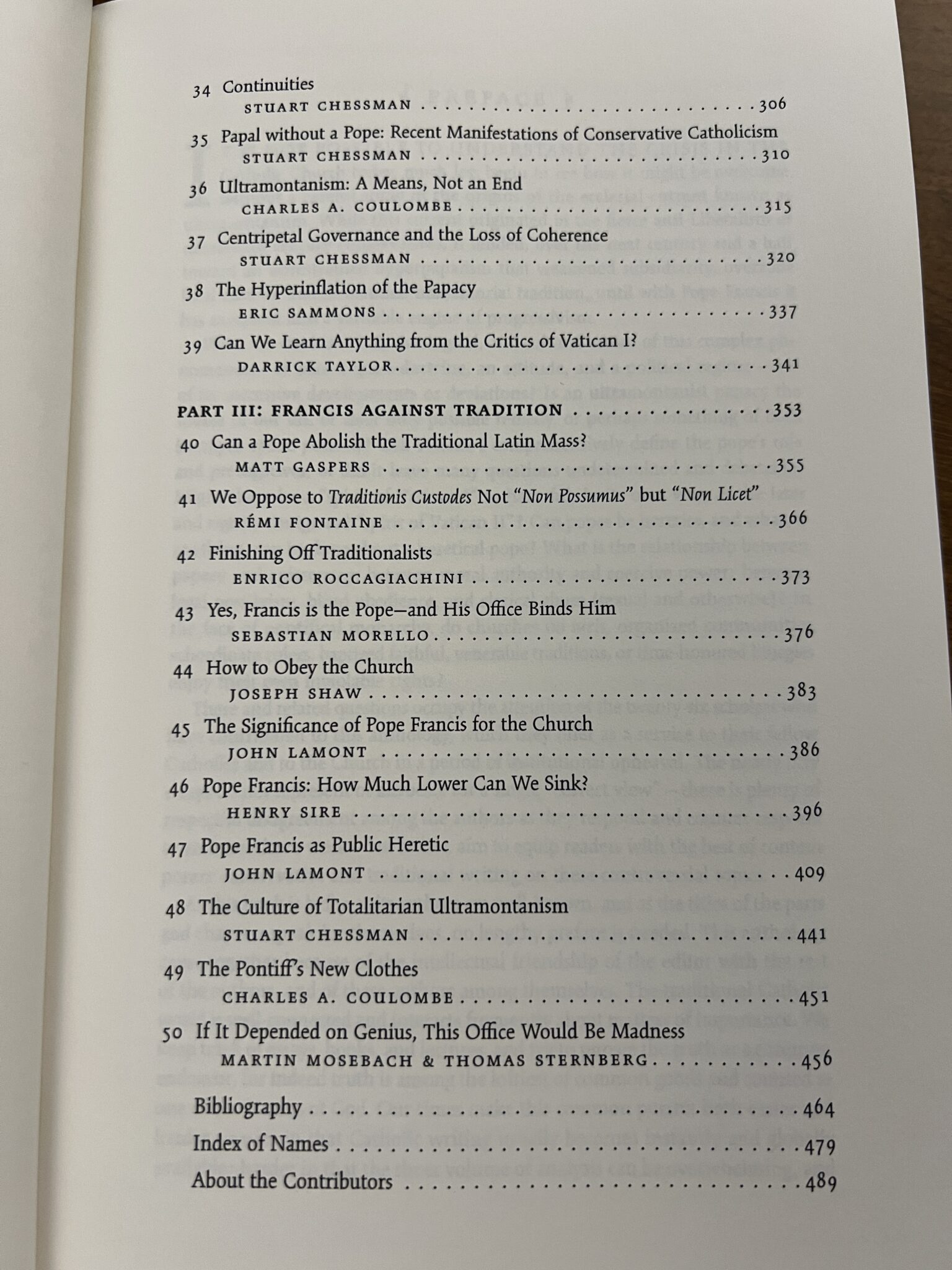
As you can see, it hefts out to over 450 pages before the bibliography and index. It is very good that there are a bibliography and index.
I thought you might like to know what is going on.


































It is likely that a good deal of this needed to be written and published. Nevertheless, I am not sure I would want an article of mine to appear side-by-side with articles titled “Papal without a Pope” and “Pope Francis as Public Heretic”. Even if the actual content of these articles show the titles to be more attention-getting than the text bears out, titles like that might be over the top.
Even if everything in the book is solid, I wonder if anything specific can be done about the mess, beyond prayer and sacrifice (which are, really, non-specific) as concrete steps taken as reform. How to reform the prelacy if it is those in control that most need the reform? What can right-minded people use as a lever or carrot that would move them? Not the seminaries. Nor written works. Nor entreaties to do what is right.
@TonyO
That is why it is typically only safe for young children or those who are very economically independent to tell the emperor that they have no clothes.
What can be done? Lots. Books like the above lay the intellectual foundations and explore the arguments that lead to action.
If one is disturbed by the current state of affairs and wants to “do something,” one must remember the principle of subsidiarity; that is deal with the issue at your level and local and don’t worry about what to do that is beyond your level or local.
For most laity that means getting their spiritual houses in order (personal and family) and then working to change the structures at their local parish. Your local parish is your local parish – stop waiting for someone else to change things and start where you can start. Brick by brick, step by step, CCD class by CCD class, financial committee meeting by meeting.
The problem is that heterodox people have gotten themselves into positions of power and gatekeeping positions within the parish, schools, and diocesan structures. The way to get them out is to either build parallel structures (ie homeschooling / classical academies) or to start getting orthodox Catholics into those positions AND THEN gatekeep like no tomorrow. It is no use to get conservative/orthodox people into positions who won’t gatekeep because of “tolerance/equity”.
The thing is,
ad 9,10,11: These topics make for an interesting theoretical debate in the peacetime of the Church. Precisely at a time when we have a Pope who is not a heretic but in a number of issues comes rather close to being one and is in danger of being confused with one – and that is the situation we are living in -, the discussion is politically a dangerous one to debate, and even if the text should be pure theory, the results on the mind of a less-abstracted trad who reads this things may be calamitous.
It does depend, a bit, on what they actually say here – there is more than one Catholic opinion on the purely theoretical question -; but not entirely.
Ad 18: In what area is Pope Leo XIII. supposed to have gone beyond his authority? In allowing a semidouble Votive-Office-of-the-Weekday to take, on a voluntary basis, the place of the ancient ferial office?
Alas, I have a feeling that the author means to say “Rerum Novarum”. In which case the author would be false. Rerum Novarum was sound doctrine on a topic really within the scope of the papal office. The fact that the rightists at the time did not like it and we do not like the leftists of the time does not make that not so. (By the way, it reads rather rightist if read today.)
Ad 35: But “recently” we have always had a Pope. So, huh? A really nice question of the day is “how to be papal against the Pope”. But “without” is, technically, immaterial (we do have a Pope), but tone-wise most dangerous obviously.
– On a more positive note, The title no. 41 sounds very apt.
Pingback: MONDAY AFTERNOON EDITION | BIG PULPIT
@Imrahil
9,10,11 most assuredly are written in a theoretical and hypothetical manner. The difficulty lies in connecting the dots between theoretical/hypothetical and actual papacies. If it looks, acts, and quacks like a duck, is it, in fact, a duck?
Is it fair to move from general hypotheticals to looking at specifics?
Perhaps back in 2014 a better case could be made that “we have a Pope who is not a heretic but in a number of issues comes rather close to being one and is in danger of being confused with one” but it is VERY difficult to, here in 2024, have have sort of confidence in that as the preponderance of the evidence is, at the present moment, at best a thing of unsurity but it is very likely that we have a duck on our hands.
Now there can be a case that sometimes people, including Popes, say heretical things – they didn’t mean it or it is from an area that they are not sound on. In the very early Church, there is some flakiness and lack of understanding with Christology and Eschatology that is definitely heretical in today’s understanding but doesn’t come from a place of heresy.
I think you and I could agree that a lot of what Pope Francis says and does “looks like and can be confused with heresy”, as you might put it. But does it come from a place of heresy? I don’t think one can say for sure that it does not, but one must, at least, entertain, that there is plausibility that it does come from such a place due to the evidence at hand.
And that is not to judge anyone — it is to simply observe that if a thing insists on walking, quaking, and looking like a duck, that it is in fact highly probably a duck.
Really, Pope Francis clearly knows that many people label him as a heretic. Yet he keeps on doing and saying heretical things. If he is not a duck he is morally bound so act to not be perceived as such, because to keep acting as a duck when one is not a duck is a sin in it of itself. He himself, if he is not a duck, discredits his office and leads people into sins of anger, confusion, blasphemies/sacrilegious attitudes against the Church and her ministers, distancing themselves from the Church, loss of faith, hope, and charity and a whole slew of other sins because he insists on acting and looking like a duck.
So that is the catch-22 — either he is causing the real danger of perdition for souls by being a duck or by acting as a duck.
We live in difficult times, and the best course of action is to follow the principle of subsidiarity as I posted above.
Re. the pictured dedication page, when did St. Padre Pio ever “confront, criticize, or circumvent” any pope?
I know he didn’t, so I ask this rhetorically. I really hope the claim is not based on the false stories about him “refusing” to celebrate mass according to the revised missals post-1962.
“These days, I am sure that most serious theologians will say, yes, they are inextricably bound together. That doesn’t make a lot of sense to me. Rome could be obliterated…”
If such a horror ever befell mankind, I could see the title “Titular Bishop of Rome” being used…
@Boniface
RE: Padre Pio
The first result of a Google Search turned up a selection of quotes from St. Padre Pio that support the St. being included in the list. They are near the bottom of this article: https://sspx.org/en/padre-pio-vatican-ii-new-mass
—-
@Geoffrey
The interesting thing to me is whether “Rome” is a geolocation or a particular people or a concept. It seems to me that it should be all three; a people of a particular culture that have a specific geolocation. The argument that “Rome” is not a geolocation but rather a people of a particular culture is the Orthodox argument that Constantinople is the “New Rome” or later that Moscow is the “Third Rome.” The Russian Orthodox argument is VERY sound should we accept the premise that “Rome” is not a geolocation but an idea that peoples can adopt.
What I also find fascinating is that it is not uncommon to find amongest the Orthodox that, should Rome “become Orthodox again” the Pope would automatically regain the Office of the Chair of Peter.
—-
One of the things that I wish Western Catholic theologians would do more of is look to the East for the questions of “Can the Pope be a heretic?”, “What do you do with a heretical Pope?”, and “How does the Office and and obedience to the Office (both by the Pope and his brother bishops) function if the Pope is a heretic?” are not hypothetical questions but are practical questions given the theological divergences between West and East. There are ~1300 years of arguments and historical actions on this topic. There is a lot that can be gleaned on what to do and what not to do as the ramifications of certain positions are the “lived realities” of Orthodoxy.
Dear Lurker59 [I don’t say “@” since this isn’t Twitter/X],
Having read many serious books about the great St. Padre Pio, and visited San Giovanni Rotundo, I am well aware that he never said or did the slightest thing in criticism of, or in resistance to, nor did he “circumvent” any of the popes – quite the contrary, as he was known for a deep reverence towards the Petrine office and additionally, the persons who variously sat upon its throne in his lifetime. I am, of course, also well aware of the (at best) second-hand (if not third- or fourth-hand) claim that he offhandedly said “end the Council quickly” to Cardinal Bacci that you found in your casual online search. If this was the entire basis for the claim made in the book about which the good Fr. Z posts here, it is very thin soup indeed. I should also note that the only book that could be the source of this supposed quote (which, on the site you reference, is totally uncited, and indeed appears only a small handful of times anywhere online, clearly copied from a single website) is also published by the same outfit.
Dear Lurker59,
but we are not obliged – I do not mean “we are not obliged” as a veiled “we must not”, as some might but in the precise sense, but I am myself very much relieved that we are not obliged – to judge the precise nature of the Pope’s “quacking”.
The question this book (apparently) treats is not entirely unknown, and yes, a thing really worthy of study (if the study doesn’t come with dangers, such as in my view at this time). But it deals with the question “what if the Pope is a proven heretic”.
That people like (excuse me) you confuse this with “what if the Pope popes so very badly, gives so very much the appearance of being against Catholicism” is precisely why I said the current time is not the time to do this study (at least in a public manner).
The question whether the Pope is a proven heretic is a simple one. It is “Has he, firmly in the face of correction, denied a dogma of the Church?” He has not.
It is the clear teaching of Scripture, repeated every now and then by the Church’s ordinary Magisterium but never in the face of settling a conflict (simply because there never was a conflict), that the State may, under certain circumstances, inflict the death penalty. But as we learnt in the treatment of Protestant heretics, “the clear teaching of Scripture” is not a dogma if it comes with the restriction “as the commenter Imrahil says on Fr Z’s blog”. Definibilis, as they call it, sure (according to my opinion), but has it been defined? Has the Church anywhere said, with “declaramus, docemus et definimus” and all that whosoever dareth to believe that the State does not under any circumstances have the right to inflict capital punishment let-him-be-anathema – and in these words?
No, she hasn’t. So, the Pope is not a heretic for being in error here, though – as I like to put it – he scrapes by it within a few feet.
And that’s the very closest the Pope has ever come to heresy.
It may, for instance, be a dogma (for all I know – canon 11 of the decree of Trent on the Eucharist goes a bit into such a direction), that “a grave sinner must not receive Holy Communion”, simply put. But to deny It to those who did something that is grave matter objectively, whatever their state of soul is which we of course don’t know about (and that is something different!) was never more than Church practice and Church law. An eminently sensible Church practice and Church law, to be sure (for a couple of reasons which would be too long to discuss here), but not dogma.
And so on.
“He’s a heretic” is not the next step after “I very much don’t like what he does, and I’m right about it”. It is a specific accusation requiring to be judged objectively on its merits, and the outcome of such a judgment can only be: He is not.
Boniface —
Sorry for getting this to you late. My use of @: sorry, I don’t mean to offend there. I don’t use twitter/x but somehow that got into my usage in message boards that don’t have quote replies functioning and I keep forgetting not to do that here.
I agree with there being a problem with sources not be cited (unfortunately the tendency is overly prevalent even in the best of Catholic materials) and the article from the SSPX (which has its own not subtle editorial agenda) (now here https://sspx.org/en/padre-pio-vatican-ii-new-mass-30366) might very well lead to a circular rabbit trail (as you pointed out). Personally, I am not so much interested in the quote to Card. Bacci but the latter block quotes, but unfortunately the source isn’t online (Google Books suggests that it Stories of Padre Pio By Katharina Tangari or The Mass of All Time: The Hidden Treasure by Marcel Lefebvre). But as you mentioned, in closer looking things over, it is either second-hand or reconstructions from personal journals (perhaps zealous).
Either way, given your well-read background of Padre Pio that you mentioned in your second posting, it is absolutely correct that those claiming Padre Pio in this instance need to properly cite their sources, or concede the point.
~Imrahil
The problem of Papal quackery is precisely that the pontiff is bound by the Petrine office to not just refrain from the periodic quacking but to actively teach and preach against those that quack. However, Pope Francis quacks and actively encourages others to quack.
I am sure that you have seen the news that the Coptic Church (probably the closest of the non-Catholic Churches to ending schism according to my understanding) has severed theological/ecumenical dialogue due to Pontifical quacking. https://cruxnow.com/church-in-the-middle-east/2024/03/coptic-church-cuts-theological-dialogue-with-catholics-says-blessing-gays-unacceptable . So the Coptic Pope thinks the Pope is a heretic precisely because of what he says and does and encourages others to say and do. Perhaps I am too loose with using the term heretic so I now return to quackery.
—“Has he, firmly in the face of correction, denied a dogma of the Church?”
There is a difference between being a duck and being so declared a duck by the Magisterium. It is a bit difficult to officially correct, censure, or force a correction in a Pontiff, wouldn’t you agree? The lack of that is not in anyway an indicator of the lack of duckyness. Secondly, “firm in the face of correction” is a sign of recalcitrance but not of duckyness, ie sign of worthy of the just penalty but not directly of the fact. The fact of being a duck in the sitting around quacking not in being asked to stop nor in the refusal to stop when asked to stop.
And yes, the Pope has been asked as officially as possible plenty of times to stop quacking. The Coptic Church severing theological ties is very high on the list of official requests to stop quacking, wouldn’t you agree?
Being a convert, let me assure you that my personal like or dislike of a person’s leadership style or theology doesn’t have an impact on me looking at their theology and actions, wondering why I hear quacking and then looking to see we have a duck on our hands.
The core problem is in the implicit denial of the efficacy of grace – that grace can and does really confect interior change and it is imperative upon the individual to anticipate, cooperate, and be transformed in grace. Fr. Schall put it another way in The Mind that is Catholic — “Charity has become, in effect, compassion, a very different thing as it is used. The first, charity, means God’s love in everything; the second, compassion, implies that one is judged by any criterion but his own, whatever that be. Compassion has replaced reason and obviated the need for forgiveness.” And that is the thing…ever since WWI Christian theology has been poisoned (first Protestant then Catholic) by complete despair in the efficacy of grace. Christianity has become about activism and social justice and anything but transformative grace won for us by Christ on His Cross.
And that is the quacking underlying everything, for the current Papal quacking is not the cause but only a symptom of the problem. Truly, history will repeat itself and the world will wakeup again to groan that it is Arian.